How to create a financial forecast for a video game shop?
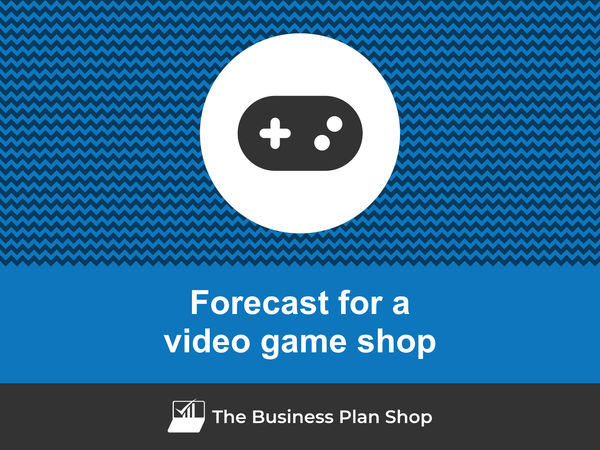
Developing and maintaining an up-to-date financial forecast for your video game shop is key in order to maintain visibility on your business’s future cash flows.
If you feel overwhelmed at the thought of putting together a video game shop financial forecast then don’t worry as this guide is here to help you.
We'll cover everything from: the main objectives of a financial forecast, the data you need to gather before starting, to the tables that compose it, and the tools that will help you create and maintain your forecast efficiently.
Let's get started!
Why create and maintain a financial forecast for a video game shop?
In order to prosper, your business needs to have visibility on what lies ahead and the right financial resources to grow. This is where having a financial forecast for your video game shop becomes handy.
Creating a video game shop financial forecast forces you to take stock of where your business stands and where you want it to go.
Once you have clarity on the destination, you will need to draw up a plan to get there and assess what it means in terms of future profitability and cash flows for your video game shop.
Having this clear plan in place will give you the confidence needed to move forward with your business’s development.
Having an up-to-date financial forecast for a video game shop is also useful if your trading environment worsens, as the forecast enables you to adjust to your new market conditions and anticipate any potential cash shortfall.
Finally, your video game shop's financial projections will also help you secure financing, as banks and investors alike will want to see accurate projections before agreeing to finance your business.
Need a convincing business plan?
The Business Plan Shop makes it easy to create a financial forecast to assess the potential profitability of your projects, and write a business plan that’ll wow investors.

What information is used as input to build a video game shop financial forecast?
A video game shop's financial forecast is only as good as the inputs used to build it.
If you are creating (or updating) the forecast of an existing video game shop, then you mostly need your accounting information, key historical operating non-financial data, and your team’s input on what to expect for the coming years.
If you are building financial projections for a video game shop startup, you will need to have done your research and have a clear picture of your competitive environment and go-to-market strategy so that you can forecast sales accurately.
For a new venture, you will also need a precise list of the resources needed to keep the video game shop running on a day-to-day basis and a list of the equipment and expenditures required to start the business (more on that later).
Let's now take a closer look at the elements that make up your video game shop's financial forecast.
The sales forecast for a video game shop
From experience, it is usually best to start creating your video game shop financial forecast by your sales forecast.
To create an accurate sales forecast for your video game shop, you will have to rely on the data collected in your market research, or if you're running an existing video game shop, the historical data of the business, to estimate two key variables:
- The average price
- The number of monthly transactions
To get there, you will need to consider the following factors:
- New Releases: As a video game shop owner, you know that new game releases can have a big impact on your sales forecast. The release of highly anticipated games can lead to increased foot traffic and higher average prices as customers are willing to pay more for the latest releases.
- Console Releases: The release of new gaming consoles can also affect your business's sales forecast. With the release of a new console, customers may be more likely to purchase new games to go along with their new system.
- Seasonality: Like many other retail businesses, your video game shop may experience seasonal fluctuations in sales. For example, the holiday season is typically a busy time for video game sales due to gift-giving and increased leisure time for students on winter break.
- Trends in Gaming: As technology and gaming trends evolve, so too may your sales forecast. For example, the rise of mobile gaming may decrease the demand for traditional console games, leading to a decrease in average prices and monthly transactions.
- Competition: The presence of other video game shops in your area can also affect your sales forecast. If there is a new competitor opening up nearby, it may lead to a decrease in your average prices and monthly transactions as customers have more options to choose from.
Once you have an idea of what your future sales will look like, it will be time to work on your overhead budget. Let’s see what this entails.
Need a convincing business plan?
The Business Plan Shop makes it easy to create a financial forecast to assess the potential profitability of your projects, and write a business plan that’ll wow investors.

The operating expenses for a video game shop
Once you know what level of sales you can expect, you can start budgeting the expenses required to operate your video game shop on a daily basis.
Expenses normally vary based on how much revenue you anticipate (which is why, from experience, it is always better to start your forecast with the topline projection), and where your business is based.
Operating expenses for a video game shop will include some of the following items:
- Staff costs: This includes wages, benefits, and any other expenses related to your employees, such as training and development.
- Rent: The cost of leasing a physical space for your video game shop.
- Utilities: This includes electricity, water, and other necessary utilities for your shop.
- Inventory: The cost of purchasing the video games and accessories to sell in your shop.
- Marketing and advertising: The expenses associated with promoting your video game shop, such as social media ads, flyers, and posters.
- Accountancy fees: The cost of hiring an accountant to help manage your financial records and taxes.
- Insurance costs: This includes general liability insurance and any other necessary insurance for your shop.
- Software licenses: The fees for any software used in your video game shop, such as point-of-sale systems or inventory management software.
- Banking fees: The charges associated with maintaining a business bank account, such as transaction fees and monthly service fees.
- Maintenance and repairs: The cost of keeping your shop in good condition, including equipment repairs and regular maintenance tasks.
- Professional services: This includes any fees for consulting services, legal advice, or other professional services related to your business.
- Supplies: The cost of necessary office supplies, such as paper, ink, and other materials.
- Credit card processing fees: The fees associated with accepting credit or debit card payments from customers.
- Shipping and delivery: The cost of shipping products to customers or receiving inventory from suppliers.
- Training and development: The expenses associated with training your employees and keeping them up-to-date on new video games and products.
This list will need to be tailored to the specificities of your video game shop, but should offer a good starting point for your budget.
What investments are needed to start or grow a video game shop?
Your video game shop financial forecast will also need to include the capital expenditures (aka investments in plain English) and initial working capital items required for the creation or development of your business.
For a video game shop, these could include:
- Storefront Renovation: This includes any updates or renovations to the physical storefront of your video game shop, such as painting, flooring, lighting, and signage.
- Equipment and Fixtures: This includes all necessary equipment and fixtures for your shop, such as display cases, shelving, cash registers, and computers.
- Inventory: This includes the initial purchase of video games, consoles, and accessories to stock your shop. It may also include ongoing inventory purchases to keep your shop stocked with the latest and most popular games.
- Furniture and Decor: This includes any furniture and decor items needed to create a welcoming and comfortable atmosphere in your shop, such as chairs, couches, and wall art.
- Security System: This includes the installation of a security system to protect your valuable inventory and equipment from theft. It may also include ongoing fees for monitoring services.
Again, this list will need to be adjusted according to the size and ambitions of your video game shop.
Need a convincing business plan?
The Business Plan Shop makes it easy to create a financial forecast to assess the potential profitability of your projects, and write a business plan that’ll wow investors.

The financing plan of your video game shop
The next step in the creation of your financial forecast for your video game shop is to think about how you might finance your business.
You will have to assess how much capital will come from shareholders (equity) and how much can be secured through banks.
Bank loans will have to be modelled so that you can separate the interest expenses from the repayments of principal, and include all this data in your forecast.
Issuing share capital and obtaining a bank loan are two of the most common ways that entrepreneurs finance their businesses.
What tables compose the financial plan for a video game shop?
Now let's have a look at the main output tables of your video game shop's financial forecast.
The profit & loss forecast
The forecasted profit & loss statement will enable you to visualise your video game shop's expected growth and profitability over the next three to five years.
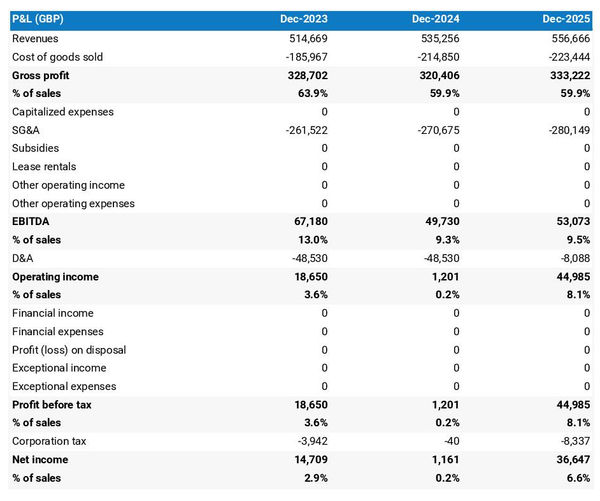
A financially viable P&L statement for a video game shop should normally show:
- Sales growing above inflation
- Stable or expanding (ideally) profit margins
- A net profit
This will of course depend on the stage of your business: a new venture might be loss-making until it reaches its breakeven point in year 2 or 3, for example.
The projected balance sheet
Your video game shop's projected balance sheet provides a snapshot of your business’s financial position at year-end.
It is composed of three types of elements: assets, liabilities and equity:
- Assets: represent what the business possesses including cash, equipment, and accounts receivable (money owed by clients).
- Liabilities: represent funds advanced to the business by lenders and other creditors. They include accounts payable (money owed to suppliers), taxes payable and loans from banks and financial institutions.
- Equity: is the combination of what has been invested by the business owners and the cumulative profits and losses generated by the business to date (which are called retained earnings). Equity is a proxy for the value of the owner's stake in the business.
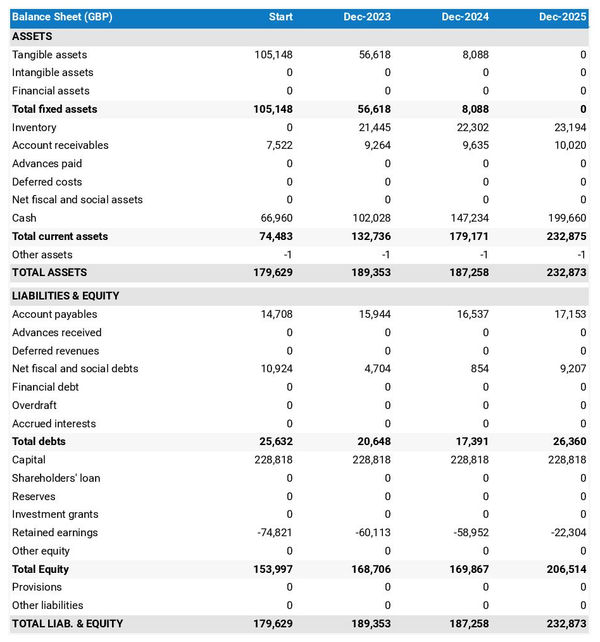
The cash flow projection
The cash flow forecast of your video game shop will show how much cash the business is expected to generate or consume over the next three to five years.
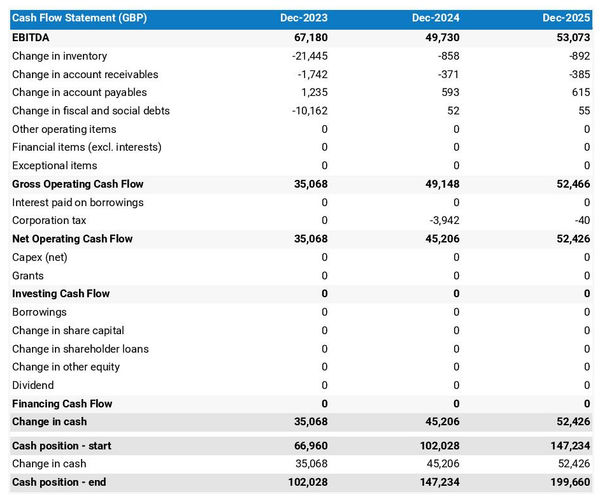
There are multiple ways of presenting a cash flow forecast but from experience, it is better to organise it by nature in order to clearly show these elements:
- Operating cash flow: how much cash is generated by the video game shop's operations
- Investing cash flow: what is the business investing to expand or maintain its equipment
- Financing cash flow: is the business raising additional funds or repaying financiers (debt repayment, dividends)
Your cash flow forecast is the most important element of your overall financial projection and that’s where you should focus your attention to ensure that your video game shop is adequately funded.
Note: if you are preparing a financial forecast in order to try to secure funding, you will need to include both a yearly and monthly cash flow forecast in your video game shop's financial plan.
Need a convincing business plan?
The Business Plan Shop makes it easy to create a financial forecast to assess the potential profitability of your projects, and write a business plan that’ll wow investors.

Which tool should you use to create your video game shop's financial forecast?
Creating your video game shop's financial forecast may sound fairly daunting, but the good news is that there are several ways to go about it.
Using online financial forecasting software to build your video game shop's projections
The modern and easiest way is to use an online financial forecasting tool such as the one we offer at The Business Plan Shop.
There are several advantages to using specialised software:
- You can easily create your financial forecast by letting the software take care of the financial calculations for you without errors
- You have access to complete financial forecast templates
- You get a complete financial forecast ready to be sent to your bank or investors
- You can easily track your actual financial performance against your financial forecast, and recalibrate your forecast as the year goes by
- You can create scenarios to stress test your forecast's main assumptions
- You can easily update your forecast as time goes by to maintain visibility on future cash flows
- You have a friendly support team on standby to assist you when you are stuck
- It’s cost-efficient and much cheaper than using an accountant or consultant (see below)
If you are interested in this type of solution, you can try our projection software for free by signing up here.
Calling in a financial consultant or chartered accountant
Outsourcing the creation of your video game shop financial forecast is another possible solution.
This will cost more than using software as you can expect as your price will have to cover the accountant’s time, software cost, and profit margin.
Price can vary greatly based on the complexity of your business. For a small business, from experience, a simple three-year financial forecast (including a balance sheet, income statement, and cash flow statement) will start at around £700 or $1,000.
Bear in mind that this is for forecasts produced at a single point in time, updating or tracking your forecast against actuals will cost extra.
If you decide to outsource your forecasting:
- Make sure the professional has direct experience in your industry and is able to challenge your assumptions constructively.
- Steer away from consultants using sectorial ratios to build their client’s financial forecasts (these projections are worthless for a small business).
Why not use a spreadsheet such as Excel or Google Sheets to build your video game shop's financial forecast?
You and your financial partners need numbers you can trust. Unless you have studied finance or accounting, creating a trustworthy and error-free video game shop financial forecast on a spreadsheet is likely to prove challenging.
Financial modelling is very technical by nature and requires a solid grasp of accounting principles to be done without errors. This means that using spreadsheet software like Excel or Google Sheets to create accurate financial forecasts is out of reach for most business owners.
Creating forecasts in Excel is also inefficient nowadays:
- Software has advanced to the point where forecasting can be done much faster and more accurately than manually on a spreadsheet.
- With artificial intelligence, the software is capable of detecting mistakes and helping decision-making.
Spreadsheets are versatile tools but they are not tailor-made for reporting. Importing your video game shop's accounting data in Excel to track actual vs. forecast is incredibly manual and tedious (and so is keeping forecasts up to date). It is much faster to use dedicated financial planning tools like The Business Plan Shop which are built specially for this.
Need a convincing business plan?
The Business Plan Shop makes it easy to create a financial forecast to assess the potential profitability of your projects, and write a business plan that’ll wow investors.

Use our financial projection templates for inspiration
The Business Plan Shop has dozens of financial forecast templates available.
Our examples contain a complete business plan with a financial forecast and a written presentation of the company, the team, the strategy, and the medium-term objectives.
Whether you are just starting out or already have your own video game shop, looking at our financial forecast template is a good way to:
- Understand what a complete business plan should look like
- Understand how you should model financial items for your video game shop
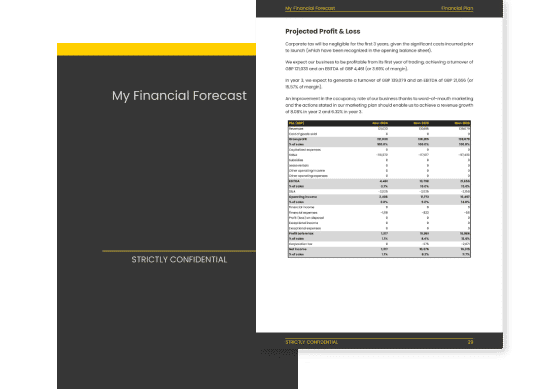
Takeaways
- A financial projection shows expected growth, profitability, and cash generation for your business over the next three to five years.
- Tracking actuals vs. forecast and keeping your financial forecast up-to-date is the only way to maintain visibility on future cash flows.
- Using financial forecasting software makes it easy to create and maintain up-to-date projections for your video game shop.
You have reached the end of our guide. We hope you now have a better understanding of how to create a financial forecast for a video game shop. Don't hesitate to contact our team if you have any questions or want to share your experience building forecasts!
Need a convincing business plan?
The Business Plan Shop makes it easy to create a financial forecast to assess the potential profitability of your projects, and write a business plan that’ll wow investors.

Also on The Business Plan Shop
- Example of financial projections
- How to write a business plan for a video game shop
- How to create a sales forecast for a business?
- Sample financial forecast for business idea
Know someone who runs or wants to start a video game shop? Share our financial projection guide with them!




